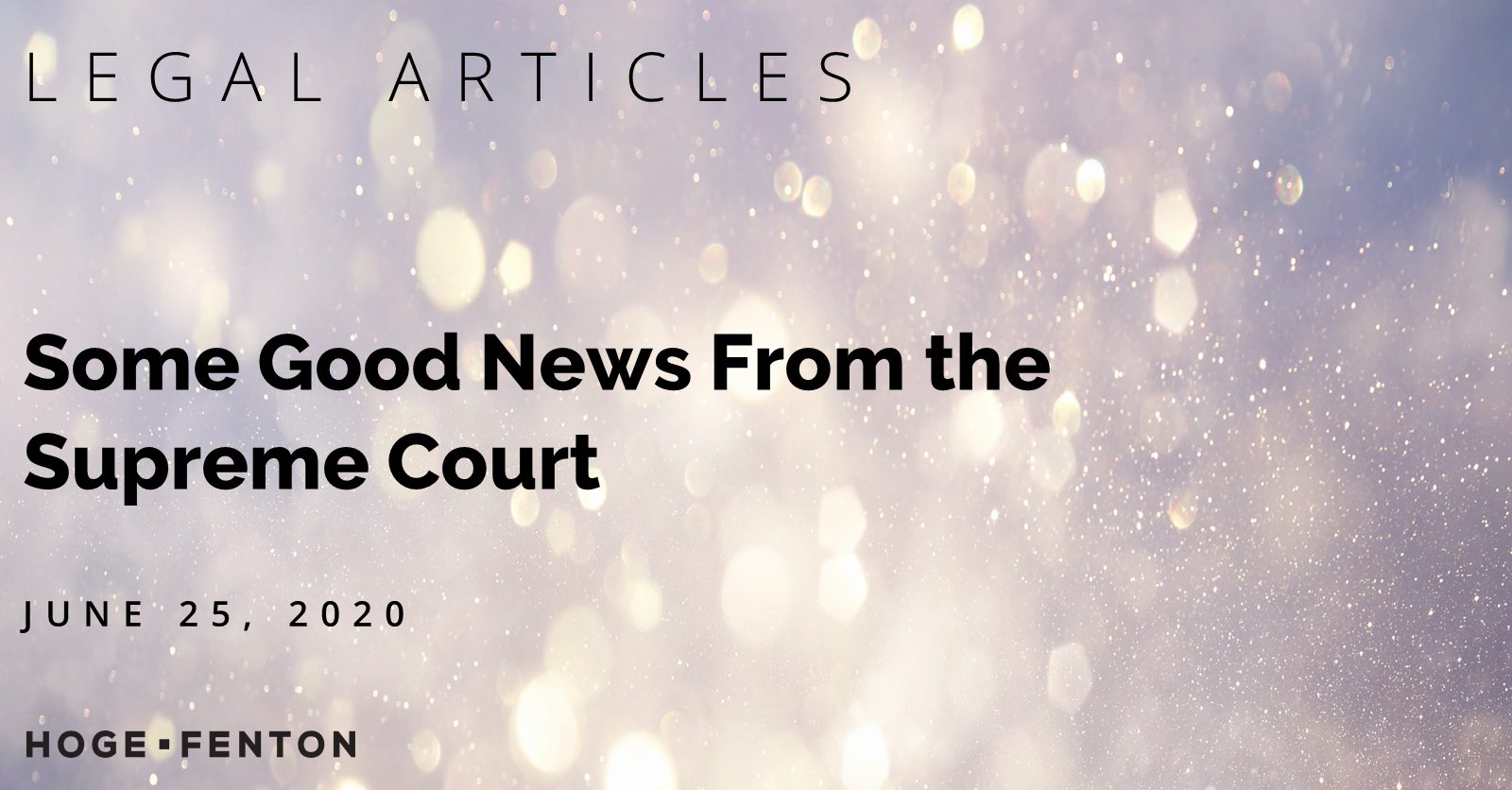Some Good News From the Supreme Court
By Hoge Fenton | 06.25.2020 | Client Alerts

The United States Supreme Court issued a series of victories for minority communities last week, improving the lives of undocumented immigrants and LGBTQ individuals. In a time when many Americans are protesting for the rights of minority communities and demanding a seat at the table, these wins are a particularly welcomed breath of fresh air.
Supreme Court Allows DACA Program to Continue, Finding
Trump Administration’s Reasoning, ‘Arbitrary and Capricious’
By: Laura Riparbelli
In a victory for approximately 650,000 people who came to the United States as children over a decade ago, the United States Supreme Court decided last week that the Deferred Action for Childhood Arrivals (“DACA”) Program — which defers deportation for certain undocumented individuals who arrived in the United States as children — can continue. At least for now.
DACA, a program put into place in 2012, defers the removal of certain undocumented individuals for a renewable two-year period and provides certain public benefits to recipients. DACA is available to individuals who have continuously lived in the United States since 2007, are not a threat to national security/public safety, and are current students, completed high school, or honorably discharged veterans. DACA does not confer citizenship or provide a path to citizenship, but it does defer the removal of recipients for the two-year period.
In 2017, shortly following Trump’s election (which included anti-immigrant rhetoric, such as referring to Mexican immigrants as “rapists”), then Attorney General Jeff Sessions directed the Department of Homeland Security to rescind the DACA program. The justification provided at the time by then-Acting Secretary of Homeland Security Elaine Duke was that the program was illegal. Several parties sued the government in various jurisdictions arguing that the rescission violated the Administrative Procedure Act (which allows parties to challenge the actions of administrative bodies) because the decision was “arbitrary and capricious.”
Chief Justice John Roberts, a George W. Bush appointee, delivered the Supreme Court’s majority decision. Chief Justice Roberts’ opinion holds that President Trump’s administration has the power to rescind DACA, but that the government’s failure to articulate justifiable reasons for eliminating DACA made its termination arbitrary and capricious. The government’s justification for doing so was that the program was “illegal” based on a Fifth Circuit decision involving a related program, despite the fact that the Fifth Circuit’s decision did not even reach the issue of whether delaying deportation for undocumented immigrants was illegal. The government also failed to consider any reliance interests that DACA recipients may have in the program. Therefore, the Court held that the government’s 2017 decision to rescind was arbitrary and capricious and the program can continue.
However, the Supreme Court declined to find in favor of the plaintiffs on the issue of whether they had stated a claim for a violation of the equal protection clause. Plaintiffs argued that the decision to rescind DACA was motivated by animus (in violated of the clause) in part based on Trump’s statements regarding Mexican immigrants. The majority found this unconvincing, holding that the plaintiffs failed to state such a claim. In her dissent, Justice Sotomayor questioned how the majority could find an absence of animus. She points to Trump’s own statements — referring to Mexican immigrants as “people that have lots of problems,” “the bad ones,” and “criminals, drug dealers, [and] rapists” and comparing undocumented persons to “animals,” responsible for “the drugs, the gangs, the cartels, the crisis of smuggling and trafficking, [and] MS13.”
The Supreme Court’s decision to allow DACA to continue is in no way fatal to the Trump administration’s efforts to rescind DACA. The administration will now have another opportunity to eliminate the program and provide new justifications for the same. Certainly, should Trump be reelected in November, the likelihood of taking this path increases.
SCOTUS Lets Stand 9th Circuit Ruling Upholding
California’s Sanctuary Law Restricting Law Enforcement’s
Cooperation With Federal Immigration Agents
By: Dan Ballesteros
The three primary and oft criticized features of the law prohibit state and local law enforcement from notifying federal agents of the release dates of undocumented immigrants, prohibits the practice of state and local officers holding immigrants beyond the end of their sentences so that agents can pick them up for deportation, and requiring employers to notify their employees whenever federal agents intend to check immigration documentation. Despite much of the inflammatory rhetoric and fake news on news outlets and online, the law enforcement restrictions do not apply to those convicted of violent crimes.
The Trump Administration argued that these sanctuary laws interfered with federal immigration enforcement efforts and that, therefore, the state law was in direct opposition to the federal law in an area where there should be exclusive federal power. However, as noted in the order written by President George W. Bush appointee, U.S. District Court Judge John A. Mendez, “California’s decision not to assist federal immigration enforcement in its endeavors is not an ‘obstacle’ to that enforcement effort.” Further, “standing aside does not equate to standing in the way.”
Proponents of sanctuary laws, including California Attorney General Xavier Becerra, say, “we’ve seen the success that comes from building trust between law enforcement and our hard working immigrant communities.” Other advocates hail SCOTUS’ decision to let the Ninth Circuit’s ruling stand as, “… a victory for our values of community, and it recognizes the power of local and state governments to use resources for good and protect residents from federal abuse.” President Trump’s opinion of sanctuary laws, that they are “deadly and unconstitutional” and “provide[s] safe harbor to some of the most vicious and violent offenders on Earth” is unsupported by evidence.
As noted by Justice Sonia Sotomayor in her concurring opinion on the DACA lawsuit, President Trump’s immigration policies seem to be shaped by his opinions evidenced by his declarations, made both before and after he assumed office, that, “Mexican immigrants are ‘people that have lots of problems,’ ‘the bad ones,’ and ‘criminals, drug dealers, [and] rapists.'” Trump also “compared undocumented immigrants” to “animals” responsible for “the drugs, the gangs, the cartels, the crisis of smuggling and trafficking, [and] MS13.”
As attorneys, we are in a unique position to make a difference. Taking action against someone based on their color, religion, sex and national origin is wrong. We shouldn’t be afraid to say so.
Supreme Court Extends Protections for
Gay and Transgender Workers
By: Ashlee Cherry
In a landmark decision, the Supreme Court held 6-3 that Title VII of the Civil Rights Act of 1964’s prohibition on discrimination in the workplace “because of sex” encompasses discrimination based on sexual orientation and gender identity. The Supreme Court’s decision resolved a circuit split resulting from three separate decisions. Gerald Bostock, who worked for Clayton County, Georgia for ten years, was terminated when he joined a gay recreational softball league for conduct “unbecoming” of a county employee. The 11 th Circuit dismissed Mr. Bostock’s case as a matter of law, holding that Title VII does not prohibit employers from firing employees for being gay. Donald Zarda was fired from his job as a skydiving instructor only a few days after he mentioned that he was gay. The 2 nd Circuit concluded that discrimination on the basis of sexual orientation did, in fact, violate Title VII and allowed the case to go forward. Finally, when Aimee Stephens got her job at a funeral home, she presented as male. Six years into her employment, she notified her employer that she intended to live and work full-time as a woman; she was immediately fired. The 6 th Circuit concluded that Title VII bars employers from firing employees because of their transgender status.
Justice Neil Gorsuch held in his majority opinion that “the answer is clear” that these are protected classes pursuant to Title VII based on the straightforward application of Title VII’s terms. Accepting that the term “sex” in 1964 referred to the biological distinctions between male and female, the Court held that “homosexuality and transgender status are inextricably bound up with sex:”
- An employer who fires an individual for being homosexual or transgender fires that person for traits or actions it would not have questioned in members of a different sex. Sex plays a necessary and undisguisable role in the decision, exactly what Title VII forbids.
There were two dissenting opinions. Justice Samuel Alito, joined by Justice Clarence Thomas, contends that when the Civil Rights Act of 1964 was written, sexual orientation and gender identity were foreign concepts, and that Title VII should not extend its protections to these classes. Justice Alito criticized that “[t]here is only one word for what the Court has done today: legislation.” Similarly, in a separate dissent, Justice Brett Kavanaugh wrote that “it was Congress’ role, not this Court’s, to amend Title VII” to encompass sexual orientation and gender identity. The majority dismissed these criticisms in its opinion, noting that “when Congress chooses not to include any exceptions to a broad rule, this Court applies the broad rule.”
- [T]hey seem to say when a new application is both unexpected and important, even if it is clearly commanded by existing law, the Court should merely point out the question, refer the subject back to Congress, and decline to enforce the law’s plain terms in the meantime. This Court has long rejected that sort of reasoning.
Sexual orientation has been a protected class in California since 1979 as to public employers and 1992 as to private employers. Gender identity has been protected in California since 2003. Nevertheless, this decision brings 25 states into the modern world and ensures that gay and transgender employees are protected from employment discrimination.
About the Authors:
 |
Laura Riparbelli is a member of the firm’s Business Litigation practice group. Laura’s experience prior to joining Hoge Fenton includes an internship at the U.S. Department of Homeland Security / Transportation Security Administration in the Office of Chief Counsel, an externship with Hon. Hector E. Ramon in the Santa Clara County Superior Court, and an internship in contract management at Intuitive Surgical, Inc. |
 |
Dan Ballesteros is an aggressive litigator, with the knowledge and experience to create leverage for your case. Dan’s practice focuses on real estate disputes, arising out of the purchase, sale, leasing, secured lending, ownership and/or use of real property. He represents businesses, LLCs, partnerships and individuals in all phases of litigation, arbitration and mediation. Dan has successfully represented brokers, sellers and buyers in cases involving the nondisclosure of defective conditions; mortgage brokers and lenders against fraudulent borrowers; and property and business owners against serial ADA litigants. |
 |
Ashlee Cherry represents clients with employment law needs ranging from wage and hour disputes and wrongful termination to disability and leave matters. She is also experienced in litigating and resolving disputes. Ashlee is a board member of the Santa Clara County Employer Advisory Council (EAC). Prior to joining Hoge Fenton, she was an associate at the Law Offices of Jeremy Pasternak, a boutique firm focused on employment disputes. Ashlee also clerked at the United States Attorney’s Office in the Civil Division in San Jose, gaining valuable experience in civil litigation matters, including employment. |
These articles are provided as an educational service. It is an overview only, and should not be construed as legal advice or advice to take any specific action. If you have questions regarding any of the content contained in this email, we recommend you seek the assistance of a knowledgeable legal professional. © 2020 Hoge Fenton











